MULTAN, Pakistan: A raging fire swept through a train in Pakistan’s eastern Punjab Province on Thursday, killing 74 people, and survivors said afterward it took nearly 20 minutes for the train to stop amid contradictory reports about the condition of the train’s brakes.
Three carriages were consumed by flames from a fire caused by a cooking gas stove and dozens of people jumped in panic from the speeding train.
Conductor Sadiue Ahmed Khan told The Associated Press the train’s emergency breaking system was in perfect working order and the train stopped within three minutes after the first signs of fire.
“This is the worst tragedy in my life as a driver,” he said.
Investigators said they will be looking at the train’s braking system to determine its condition at the time of the fire. Survivors recounted pulling at emergency cords that weave through the train to notify the conductor, but they said the train continued to speed down the tracks.
Ghulam Abbas, a passenger who had gotten on the train in the town of Nawabshah in neighboring Sindh Province with his wife and two children, echoed other passengers who said it took nearly 20 minutes for the train to stop. He recousnted watching panicked passengers jumping off the speeding locomotive.
“We learned afterward that most of them had died,” he said.
Abbas’ wife, Sulai Khan Bibi, said she was horrified what would happen to their two small children. “We were so close to death, but Allah saved us,” she said, clutching the children.
The train, which was traveling from the southern Arabian Sea port city of Karachi to Rawalpindi, just 10 kilometers (6 miles) from the federal capital, was carrying 857 passengers. Most of the dead were members of Tableeqi-e-Jamaat, an organization of Islamic missionaries. The fire was believed to have started in their compartment.
Mufti Wahab, a district chief of the Tableeqi-e-Jamaat, said as many as 52 members of his organization were “martyred because of the fire.”
The fire apparently started after one of several small stoves brought on to the train by the the Tableeqi members exploded, setting other gas cylinders used to fuel the stoves on fire, said Deputy Railways Commissioner Jamil Ahmed.
Flames roared through the train engulfing three carriages as it approached the town of Liaquatpur in Punjab. Survivors recounted horrific scenes of fellow passengers screaming as they jumped through windows and off the train, flames billowing from the carriages.
“We could hear people crying and screaming for help,” said Chaudhry Shujaat, who had boarded the train just a few hours earlier with his wife and two children. “I thought we would die. The next car was on fire. We felt so helpless.”
Kaleem Ullah, an official with the district emergency services, said of the 43 people injured, 11 were still in critical condition. Several of them had jumped off the train — many to their deaths — after the fire broke out and before it eventually screeched to a halt, said Ahmed, the railways official.
In Pakistan, poor passengers often bring their own small gas stoves on the trains to cook their meals, despite rules to the contrary, according to Railways Minister Sheikh Rashid Ahmed. Safety regulations are often ignored in the overcrowded trains.
Railway official Shabir Ahmed said bodies of passengers were scattered over a 2 kilometer- (1 mile-) wide area around the site.
People from nearby villages rushed to the train, carrying buckets of water and shovels to help douse the flames. “But it was impossible,” said Ahmed.
Through the morning hours, rescue workers and inspectors sifted through the charred wreckage, looking for survivors and aiding the injured. Local Pakistani TV footage from the scene showed a huge blaze raging as firefighters struggled to get it under control.
Officials said they were still trying to identify the victims and that the lists of fatalities and those injured were not ready yet. Another train was dispatched to bring the survivors to the city of Rawalpindi, they said.
Yasmin Rashid, a provincial minister in Punjab, told reporters that medical staff were providing the best possible treatment for the injured at a hospital in Liaquatpur. Those critically injured were taken by ambulance to the city of Multan, the largest city nearest to the site of the accident.
Pakistan’s military said troops were also participating in the rescue operation. President Arif Alvi and Prime Minister Imran Khan issued statements expressing their sorrow over the tragedy.
Khan took to Twitter to offer his condolences to the families of those killed and say he was praying for the speedy recovery of the injured. He also ordered an urgent investigation into the incident.
UN Secretary-General also extended “deep condolences” to the families of the victims as well as the people and government of Pakistan and wished “a swift and full recovery to those who were injured,” UN spokesman Stephane Dujarric said.
Train accidents in Pakistan are often the result of poor railway infrastructure and official negligence. Media reports on Thursday suggest that railways officials did not notice when passengers boarded the train, carrying individual gas stoves.
In July, a passenger train rammed into a freight train at the Walhar Railway Station in the district of Rahim Yar Khan, killing at least 20 people and injuring 74.
A month earlier, a passenger train traveling to the eastern city of Lahore from the port city of Karachi collided with a freight train in the southern city of Hyderabad, killing three people.
Survivors say burning train took 20 minutes to stop, 74 dead
Survivors say burning train took 20 minutes to stop, 74 dead
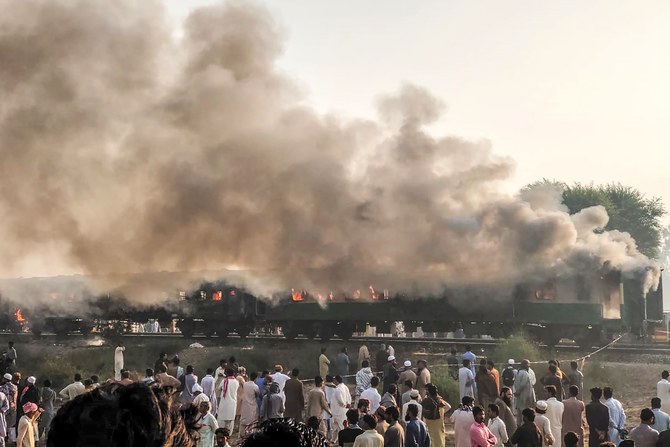
- The train which was traveling from Karachi to Rawalpindi was carrying 857 passengers
- PM Khan ordered an urgent investigation into the incident
Pakistan’s Lahore hosts 24th edition of Asian Forum’s tech innovation event
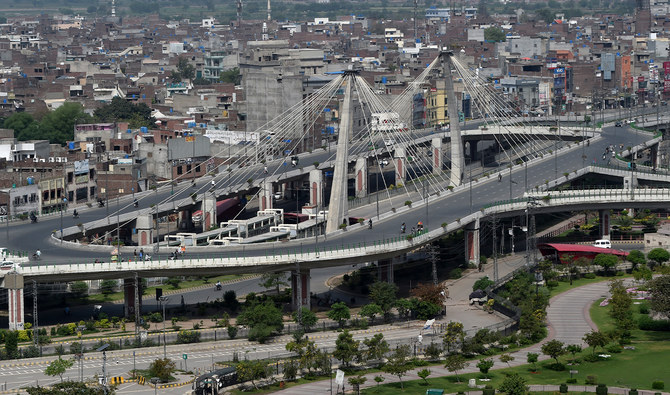
- The three-day exhibition is set to fetch nearly $500 million investment from a dozen countries
- These companies participating in the expo include Microsoft, Inbox, Lenovo, HP, NetSol and Dell
ISLAMABAD: Pakistan’s eastern city of Lahore is set to host the 24th edition of Asian Forum’s Information Technology Commerce Network (ITCN) today, on Thursday, Pakistani state media reported.
State Minister for Information Technology Shaza Fatima will be the chief guest, while Digital Cooperation Organization (DCO) Secretary-General Deemah Al-Yahya will be guest of honor on the opening day of summit at Lahore’s Expo Center.
The main sessions include Artificial Intelligence Summit, Global Security Symposium, Gaming and Scholars Roundtable, Investor Summit, Freelancer Summit, Made in Pakistan Roundtable Conference, the state-run Radio Pakistan broadcaster reported.
“In this edition, a delegation of international investors belonging to twelve counties will participate along with an investment of five hundred million dollars,” the report read.
“Over seven hundred stalls will be established and renowned international and national technology companies will participate in this event.”
These companies include Microsoft, Inbox, Red Hat, TP-Link, Lenovo, HP, NetSol, Abacus and Dell, according to the report.
The event is being jointly supported by the Pakistani Ministry of Information Technology and Telecommunication, Pakistan Telecommunication Authority, Special Investment Facilitation Council (SIFC), Pakistan Software Export Board and Pakistan Software Houses Association.
Pakistan wants to re-engage with Middle Eastern banks in multiple areas — finance minister
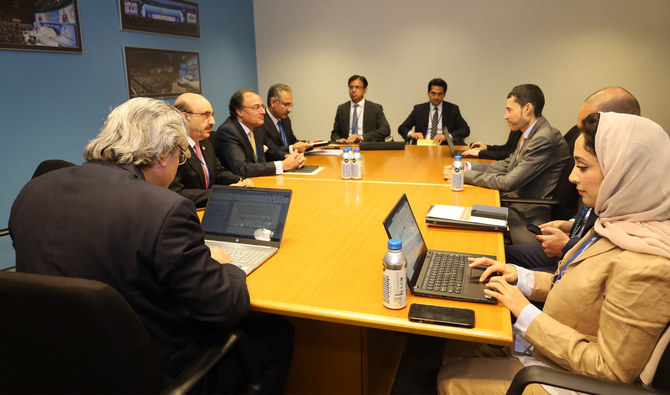
- Statement came during Mohammad Aurangzeb’s meeting with his Emirati counterpart on sidelines of his US visit
- The Pakistani finance minister briefed about priority areas of taxation, energy and privatization of state entities
ISLAMABAD: Finance Minister Muhammad Aurangzeb on Wednesday met with his Emirati counterpart and expressed his country’s desire to re-engage with Middle Eastern banks in multiple fields, the Pakistani finance ministry said.
Aurangzeb’s meeting with UAE’s Minister of State for Financial Affairs Mohamed bin Hadi Al Hussaini came on the sidelines of his visit to the United States to meet International Monetary Fund (IMF) and World Bank officials.
The Pakistani foreign minister acknowledged long-standing brotherly ties between Pakistan and the United Arab Emirates (UAE) and appreciated the Gulf country’s support to help Pakistan deal with its economic challenges.
“The minister briefed UAE’s Minister of State for Financial Affairs about the priority areas of taxation, energy and privatization of SOEs (state-owned enterprises),” the Pakistani finance ministry said in a statement.
“He also informed that Pakistan wanted to re-engage with Middle Eastern Banks.”
Aurangzeb arrived in Washington on Sunday to participate in spring meetings organized by the IMF and World Bank.
On Wednesday, he attended the Middle East and North Africa (MENA) Ministers and Governors meeting with the IMF managing director, and highlighted geo-economic fragmentation and its impact on Pakistan.
“He thanked IMF, MDBs (multilateral development banks) and its time-tested sincere bilateral partners for their support in helping the country respond to unprecedented challenges,” Aurangzeb’s ministry said in a separate statement.
“He further underscored aggressive reforms including broadening the tax net, privatizing loss making SOEs, expanding social safety net and facilitating the private sector.”
The minister underlined the importance of rechanneling of special drawing rights (SDRs), review of surcharges policy and prioritizing the Resilience and Sustainability Trust (RST) in view of climate vulnerabilities.
“The minister called for a more proactive and responsive Global Financial Safety Net to tackle the elevated risks,” the statement read.
“He welcomed the renewed emphasis of the Fund on Capacity Building through Regional Capacity Development Centers (RCDCs).”
During the engagements, Aurangzeb also met with Multilateral Investment Guarantee Agency (MIGA) Executive Vice President Hiroshi Matano and appreciated the Agency’s continued support to Pakistan in attracting foreign investments.
“The minister discussed the ongoing economic reforms, investment climate and measures to enhance investor confidence in Pakistan,” his ministry said.
Aurangzeb’s tour is an important one for the South Asian country as an ongoing nine-month, $3 billion loan program with the IMF designed to tackle a balance-of-payments crisis, is set to expire this month.
With the final $1.1 billion tranche of that deal likely to be approved later this month, Pakistan has begun negotiations for a new multi-year IMF loan program worth “billions” of dollars, according to the finance ministry.
In an interview on Monday, Aurangzeb said Pakistan would seek at least a three-year IMF program and planned to continue with necessary policy reforms to rein in deficits, build up reserves and manage soaring debt servicing.
Australia mulls citizenship for Pakistani guard in Sydney mall attack
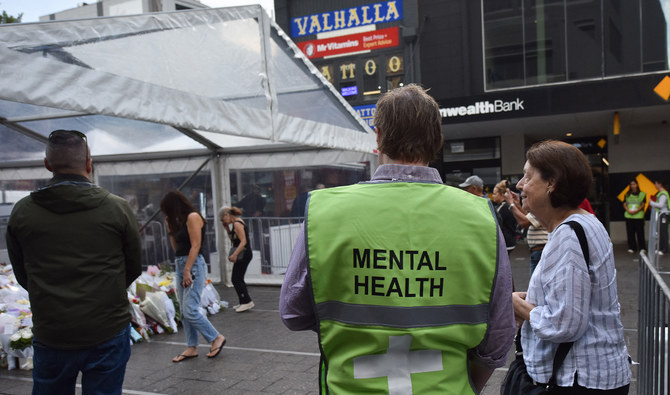
- The guard, Muhammad Taha, reportedly said he believed he ‘deserved recognition, consideration for citizenship’ after being stabbed
- He was attacked just after fellow Pakistani security guard, Faraz Tahir, one of the six people killed at the Westfield shopping complex
SYDNEY: Australia’s prime minister said Thursday he will consider granting citizenship to a Pakistani security guard wounded in the deadly Sydney shopping center knife attack.
The guard, Muhammad Taha, reportedly said he believed he “deserved recognition and consideration for citizenship” after being stabbed.
In a bedside interview with The Australian, Taha said he was attacked just after fellow Pakistani security guard Faraz Tahir, one of the six people killed at the Westfield shopping complex in Bondi Junction.
Taha has a graduate visa due to expire in less than a month, the paper said.
The guard reportedly noted that Frenchman Damien Guerot, since dubbed “bollard man,” had been offered permanent residency after video shared on social media showed him using a bollard to fend off the attacker, Joel Cauchi.
Asked in a radio interview if the Australian government would entertain Taha’s citizenship request, Prime Minister Anthony Albanese said: “Yes, we certainly will.”
Albanese described the killing of Faraz Tahir as a “tragedy.”
“This other person, Muhammad Taha, he confronted this guy, the perpetrator, Joel Cauchi, on Saturday. And it just shows extraordinary courage,” the prime minister said.
Both men put themselves in danger to protect Australians they did not know, Albanese said.
“That’s the sort of courage that we want to say thank you to, frankly.”
Albanese said Guerot would receive permanent residency, which he had been seeking, on Thursday.
French President Emmanuel Macron on Tuesday hailed Guerot and his fellow Frenchman Silas Despreaux for trying to stop the mall attacker.
Pakistan kick off T20 World Cup 2024 preparations with New Zealand series today

- Today’s match to see return of Mohammad Amir, Imad Wasim and Naseem Shah to Pakistan’s national squad
- Pakistan’s white-ball captain Babar Azam says team eager to express themselves as a unit in today’s match
ISLAMABAD: The Pakistan cricket team will kick off their preparations for the ICC World Cup 2024 by taking on New Zealand in the first match of the T20I series against the Black Caps in Rawalpindi today, Thursday.
Led by experienced all-rounder Michael Bracewell, New Zealand’s cricket team arrived in Pakistan last week to play the five-match T20I series from April 14-28. Rawalpindi will also host matches on Saturday and Sunday, while Lahore’s Qaddafi Stadium will be the stage for the remaining two matches next week on Thursday and Saturday.
This will be the third five-match series between the two sides inside a 12-month period. Last year, Pakistan and New Zealand drew the series at two-all in Pakistan, while New Zealand clinched the series 4-1 earlier at their home.
“This five-match T20I series holds a lot of importance for us as we look forward to preparing for the all-important mega-event,” Pakistan’s white-ball captain Babar Azam said during a news conference on Wednesday.
“We had a great fitness camp in Kakul and are looking forward to express ourselves as a unit.”
Pakistan have named uncapped Abrar Ahmed, Mohammad Irfan Khan and Usman Khan in the 17-player squad. Pacer Mohammad Amir and all-rounder Imad Wasim, who came back from retirement last month. are also back in the national squad.
The series will also mark fast bowler Naseem Shah’s return to the national squad, who last played for Pakistan in Asia Cup 2023 before suffering a shoulder injury. The injury proved to be a fatal blow for Pakistan, sidelining Shah from the ICC Men’s Cricket World Cup 2023 and tours of Australia and New Zealand.
Bracewell said he was excited to lead New Zealand on the Pakistan tour, adding that his team was raring to play good cricket against the hosts.
“Pakistan are formidable side at home and we’ll look to put challenges in their backyard,” he said.
The match is scheduled to begin at 7:30 p.m. Pakistan Standard Time.
Squads:
Pakistan — Babar Azam (captain), Abrar Ahmed, Azam Khan, Fakhar Zaman, Iftikhar Ahmed, Imad Wasim, Mohammad Abbas Afridi, Mohammad Rizwan, Mohammad Amir, Muhammad Irfan Khan, Naseem Shah, Saim Ayub, Shadab Khan, Shaheen Shah Afridi, Usama Mir, Usman Khan and Zaman Khan
New Zealand — Michael Bracewell (captain), Tom Blundell, Mark Chapman, Josh Clarkson, Jacob Duffy, Dean Foxcroft, Ben Lister, Cole McConchie, Jimmy Neesham, Will O’Rourke, Tim Robinson, Ben Sears, Tim Seifert, Ish Sodhi and Zak Foulkes.
Analysts hail Saudi FM’s ‘significant’ visit, say investments will boost Pakistan’s economy
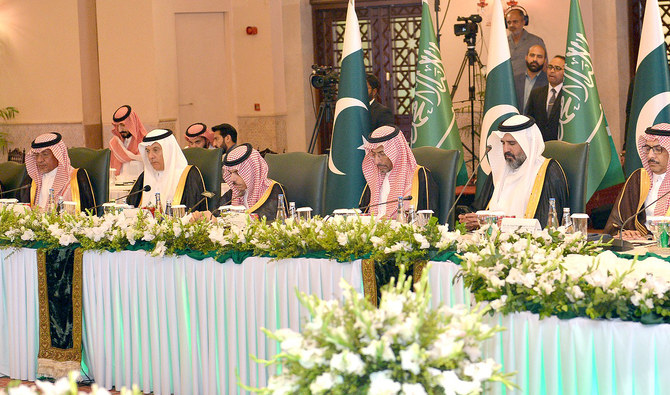
- Saudi Arabia’s foreign minister visited Pakistan this week to discuss investments and enhance bilateral economic cooperation
- Former diplomat says Saudi investments could increase to $25 billion if Pakistan provides conducive environment to Saudi investors
ISLAMABAD: Former Pakistani diplomats and analysts on Wednesday hailed Saudi Foreign Minister Faisal bin Farhan Al Saud’s “significant” visit to Pakistan, saying that investment agreements reached between the two sides could lead to the creation of thousands of jobs in the South Asian country and boost its economic prospects.
Prince Faisal bin Farhan arrived in Islamabad on a two-day official visit on Monday. The minister led a high-powered delegation to Islamabad with his visit aimed at enhancing bilateral economic cooperation and pushing forward previously agreed investment deals.
His trip came a little over a week after Crown Prince Mohammed bin Salman met Prime Minister Shehbaz Sharif in Makkah and reaffirmed the Kingdom’s commitment to expedite investments worth $5 billion.
Pakistan and Saudi Arabia enjoy strong trade, defense and cultural ties. The Kingdom is home to over 2.7 million Pakistani expatriates and the top source of remittances to the cash-strapped South Asian country.
“Pakistan has longstanding ties with Saudi Arabia but now it has taken a new dimension of economic cooperation,” Zahid Hussain, a senior journalist and political analyst, told Arab News.
“And that’s why this visit was very significant.”
Hussain said the Saudi foreign minister’s visit had turned out to be a “very productive” one as both sides held discussions on investment opportunities that he said Pakistan could offer to Saudi businessmen.
“They have discussed various opportunities which are beneficial for Saudis for investment and that could be said as the turning point in the Pakistan and Saudi relationship,” Hussain added.
During his two-day official trip, the Saudi foreign minister held meetings with top civilian and military leadership including Prime Minister Shehbaz Sharif and army chief General Syed Asim Munir. The Saudi delegation was also briefed by the Special Investment Facilitation Council (SIFC), a key government body set up in June 2023 to fast-track decisions related to international investment in Pakistan’s key sectors IT, mining, energy and agriculture.
Speaking at a joint press conference in Islamabad on Tuesday along with his counterpart Ishaq Dar, Prince Faisal said there was a “significant opportunity” for the Kingdom to increase its investments in Pakistan.
Former diplomat Javed Hafeez said potential Saudi investments will enhance Pakistan’s exports and lead to the creation of thousands of new jobs for Pakistani professionals in the energy, mining, agriculture, and other sectors.
“This would have an overall positive effect on other sectors as well and on Pakistan’s economy,” he noted.
Hafeez said the Kingdom’s investments in Pakistan could increase to the tune of $25 billion from initial investments of $5 billion, provided Islamabad succeeds in ensuring a conducive environment for Saudi investors.
“I see it [initial investments of $5 billion] as a test case,” Hafeez said. “If we can provide the foolproof security [to Saudi investors] and if these projects are successful, then of course much more investment will come.”










